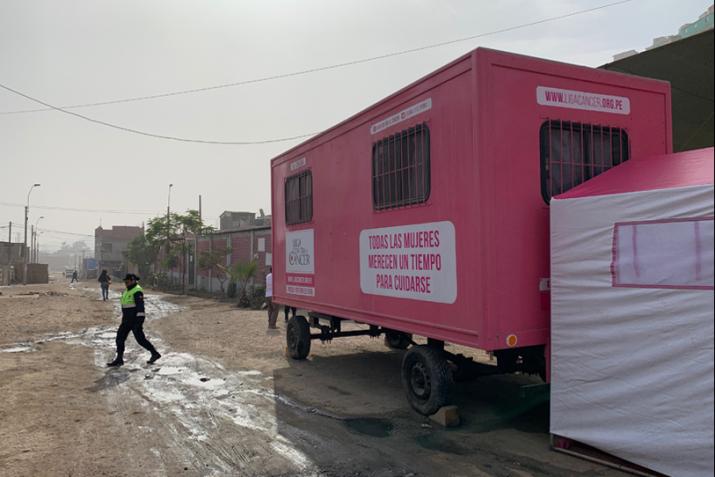
A mobile unit serving women in the community of Ate, Peru, displays the message “Every woman deserves the chance to take care of herself.”
Published July 25, 2019, last updated on April 6, 2020 under Voices of DGHI
This past summer, I was lucky enough to receive an award from the Paul Farmer Global Health Fund to assist Michelle Pieters, a master’s student in global health, with her thesis research in Lima, Peru. The project, titled “Knowledge, Attitudes and Practices Regarding Cervical Cancer Screening in Lima, Peru,” was designed to interview women in low-income areas surrounding Lima about their experiences with screenings for cervical cancer.
During this time, I mostly took notes, transcribed and translated interviews, and assisted with organizing data. I gained new skills and improved my ability to be detail-oriented. Most importantly, I was able to get valuable insight on the processes, coordination and thoughtful planning that it takes to implement a long-term project such as this one.
One of the key takeaways from the summer was the ability to not only see a situation from someone else’s perspective, but use that perspective to understand their actions and motives. This was especially evident given that we were a diverse team working in unfamiliar territory. I also realized how important and useful qualitative data can be and what you are able to derive from that data. Although (at this point) we have only gathered half the subject data, many trends and factors are becoming clear and providing important insight to circumstances that women face in Lima.
But most importantly, I came away with deep appreciation for the work of La Liga Contra el Cancer, whose mobile units provide screenings for so many women in the area. It was extraordinarily powerful to see women lining up for the mobile unit in Villa El Salvador, waiting for sometimes an hour or two in the biting cold. That image will stick with me.
After many interviews, women would passionately express their gratitude for the mobile unit and the work that the obstretas (midwives) do. Many women mentioned that the 15-minute interaction with an obstreta influenced whether they would return to get screened. This is critical in low-resource areas, where a negative experience with a medical professional could easily dissuade women from accessing care.
My fieldwork also taught me a lot about cervical cancer and the role it plays in Lima. Many women, when asked what they thought of first when thinking about cervical cancer or what drove them to get examined, spoke of their children. Their concern for their family (especially their children) and fear of what would happen to them if they were no longer healthy was a driving factor for many of these women to get examined. I thought this was very interesting because it spoke to the fact that even today, many women continue to see their primary role as a caregiver and one that is centered around the home and raising a family. Secondly, it demonstrates how influential and important familial ties are in Peru, something I have witnessed and felt from my own personal experience in the country.
I was also surprised to see the diverse conditions that define women’s lives in Peru. One location we visited in the mobile unit was in the midst of a metropolis, with paved roads and infrastructure. Another district was completely opposite, with dirt roads, houses in disrepair and no apparent running water. Yet each location brought with it unique common themes, reactions and challenges to the women we interviewed.
My experience this summer has been an eye-opening one. I was able to see Peru, a country I have visited many times, in a different context. I was able to reflect on how certain ways of thinking have shaped who I am today, what cultural aspects I could see in myself, as well as how I my thoughts differed from certain norms. Most importantly, this summer, I have witnessed the importance of small things, such as how you greet someone, how a doctor interacts with a patient, or even how you choose to organize data.
This has inspired me, and in the future I want to work toward implementing and improving procedures that target these “small things,” such as personalized patient care, increased access to resources and building a reliable support system within certain communities. I believe that with the knowledge I have gained through observing and hearing about this research process, I am in a better place accomplish this now than I was four weeks ago.


